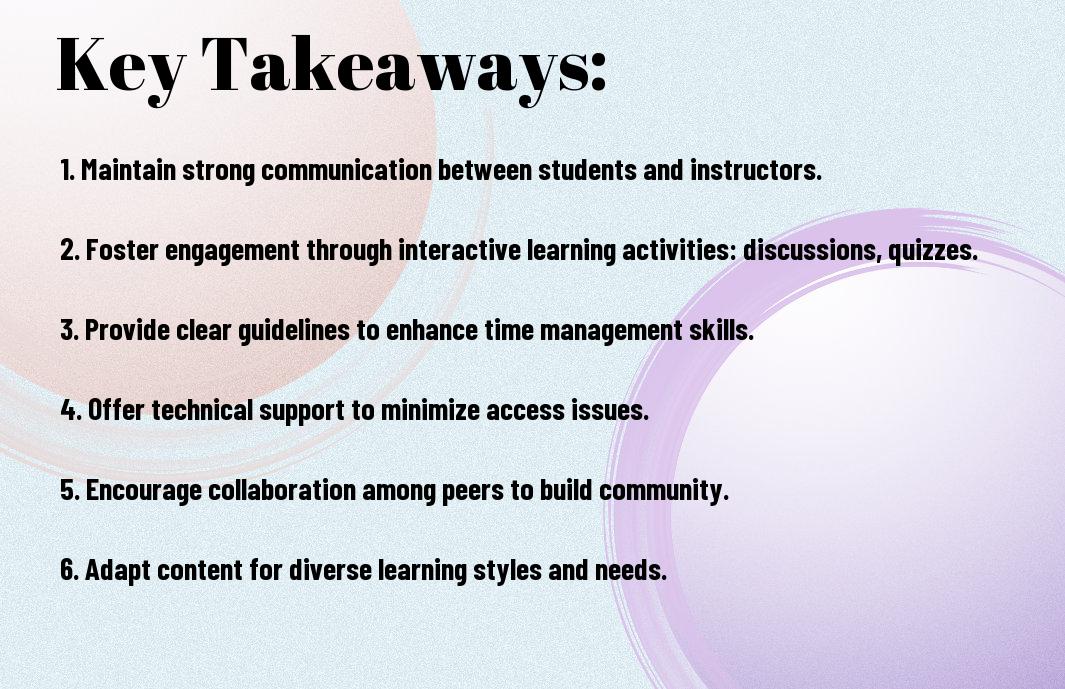As you explore online education, you will encounter various obstacles that can hinder your learning experience. Your ability to succeed depends on understanding these challenges and finding effective solutions. You may face difficulties with self-motivation, technical issues, and limited feedback, which can impact your progress. By recognizing these challenges, you can develop strategies to overcome them and achieve your academic goals, making your online education journey more productive and successful. You will learn how to navigate these obstacles and maximize your online learning experience.

Key Takeaways:
To succeed in online education, it’s important to understand the challenges that come with it. Here are the top challenges and how to overcome them:
- Technical Issues: Online education relies heavily on technology, and internet connectivity problems can hinder the learning experience. To overcome this, invest in a reliable internet connection and have a backup plan in place, such as a mobile hotspot or a secondary device.
- Lack of Engagement: Online courses can sometimes feel isolating, leading to a lack of student engagement. To combat this, incorporate interactive elements, such as discussion forums, live chats, and video conferencing, to encourage student participation.
- Self-Motivation: Online education requires self-discipline and motivation to stay on track. To overcome this, set clear goals and deadlines, and create a dedicated study space to help stay focused.
- Limited Feedback: Online education can make it difficult to receive immediate feedback from instructors. To address this, utilize online assessment tools and regular check-ins with instructors to ensure progress tracking and support.
- Accessibility: Online education can be inaccessible to students with disabilities if not designed with inclusivity in mind. To overcome this, ensure that online courses are designed with accessibility features, such as closed captions and screen reader compatibility, to provide equal learning opportunities for all students.
Technical Challenges
For online education to be effective, you need to overcome technical challenges that can hinder your learning experience. You will face issues with technology, which can be frustrating and affect your progress.
Platform Issues
One of the main technical challenges you will encounter is platform issues, such as poor user interface, navigation problems, and compatibility issues with your device. You need to ensure that your device meets the system requirements to access the online platform seamlessly.
Internet Connectivity Problems
For your online education to be successful, you need a stable internet connection. You will face internet connectivity problems, such as slow speeds, disconnections, and poor network coverage, which can disrupt your learning.
For instance, if you are watching a video lecture and your internet connection is slow, you will experience buffering, which can be frustrating and affect your understanding of the subject matter. You can overcome this by using a reliable internet service provider, restarting your router, or using a mobile hotspot as a backup. This will ensure that you have a stable connection and can access your online courses without interruptions.

Pedagogical Challenges
While navigating the world of online education, you will encounter various pedagogical challenges that can impact your learning experience. To better understand these challenges, you can visit 7 Top Challenges with Online Learning For Students (and How to Overcome Them) to gain insights into the common obstacles you may face.
Lack of Face-to-Face Interaction
Approximately, you will find that online education often lacks the face-to-face interaction that traditional classrooms provide, which can hinder your ability to connect with instructors and peers on a personal level.
Difficulty in Assessing Student Progress
For instance, assessing student progress can be a significant challenge in online education, as you may not have direct access to your students’ work and progress in real-time.
The difficulty in assessing student progress is further complicated by the fact that you may not be able to see your students’ thought process and problem-solving skills, making it harder to provide constructive feedback and adjust your teaching strategies accordingly.
Student Engagement
Your online course’s success heavily relies on engaging your students, as it directly impacts their learning outcomes and overall experience.
Motivating Students
Among the various strategies to motivate students, using real-life examples and providing feedback are effective ways to keep them interested and invested in the course material.
Encouraging Participation
Students who feel comfortable sharing their thoughts and ideas are more likely to participate in online discussions, and you can facilitate this by creating a supportive and inclusive environment.
Also, by incorporating interactive elements such as quizzes, polls, and group projects, you can encourage participation and make your online course more engaging, allowing you to track your students’ progress and adjust your teaching strategies accordingly to meet their needs.
Accessibility Challenges
To ensure equal learning opportunities, you need to address accessibility challenges in online education. You will encounter various obstacles that can hinder your ability to access educational resources.
Limited Access to Technology
One significant hurdle you may face is limited access to technology, which can prevent you from participating in online courses or accessing digital materials.
Language Barriers
Against the backdrop of a global online learning community, you may encounter language barriers that can impede your understanding of course materials and communication with instructors.
For instance, if you are not proficient in the language of instruction, you may struggle to comprehend complex concepts, navigate online platforms, or engage in discussions with your peers, which can ultimately affect your overall learning experience and outcomes, and you should consider seeking language support or alternative courses that cater to your linguistic needs.
Teacher Training
Now that you are adapting to online education, you need to focus on your training to effectively teach your students. This involves developing new skills and staying up-to-date with the latest technology and teaching methods.
Developing Online Teaching Skills
Behind every successful online course is a well-trained teacher, so you should prioritize developing your online teaching skills to engage your students and deliver your content effectively.
Staying Up-to-Date with Technology
For you to succeed in online education, you need to stay current with the latest technological advancements and teaching tools, which will enable you to create a more interactive and immersive learning experience for your students.
Developing a routine to stay updated with the latest technology is important, as it will allow you to explore new tools and methods to enhance your teaching and make your online courses more engaging, helping you to better support your students and improve their learning outcomes, and ultimately, increasing your confidence and competence as an online educator.
Student Support
Not all online education platforms provide adequate support to their students, which can lead to frustration and disappointment. You need to ensure that your online course offers sufficient support to help your students succeed.
Providing Academic Support
Academically, you can provide support through various means, such as online tutorials, regular feedback, and access to instructors. You can also offer additional resources, such as study guides and practice exams, to help your students prepare for assessments.
Addressing Technical Issues
Above all, technical issues can be a significant obstacle to online learning. You should have a plan in place to address these issues promptly, such as a dedicated IT support team or a comprehensive FAQ section.
And as you work to address technical issues, you will find that it is crucial to be proactive, monitoring your system for potential problems and having a backup plan in place. You can also provide your students with troubleshooting guides and encourage them to contact your support team if they encounter any issues, ensuring that they can quickly get back to learning.
Conclusion
Following this discussion, you can now identify the top challenges of online education and how to overcome them. As you navigate your online learning journey, you will face unique obstacles, but with the right strategies, you can succeed. For more insights, visit Top Challenges Online College Students Face and How To Cope to enhance your online learning experience and achieve your academic goals, improving your overall education.
FAQ
Q: What are the most significant challenges that students face in online education, and how can they be addressed?
A: The most significant challenges that students face in online education include lack of face-to-face interaction, technical issues, and difficulty in staying motivated. To address these challenges, students can establish a dedicated study space, invest in reliable technology, and set achievable goals. Additionally, students can engage with their instructors and peers through online discussion forums, video conferencing, and social media to stay connected and motivated. By being proactive and seeking support when needed, students can overcome these challenges and achieve success in online education.
Q: How can instructors ensure that online courses are engaging and effective, and what strategies can they use to promote student participation and interaction?
A: Instructors can ensure that online courses are engaging and effective by using a variety of teaching methods, such as video lectures, interactive simulations, and gamification. They can also use discussion forums, live chats, and video conferencing to promote student participation and interaction. Additionally, instructors can provide regular feedback, encourage collaboration among students, and use analytics to track student progress and identify areas where students may need extra support. By using these strategies, instructors can create an online learning environment that is engaging, interactive, and supportive, and that helps students achieve their academic goals.
Q: What role can technology play in overcoming the challenges of online education, and what are some of the most effective tools and platforms that can be used to support online learning?
A: Technology can play a significant role in overcoming the challenges of online education by providing students with access to a wide range of educational resources, tools, and platforms. Some of the most effective tools and platforms that can be used to support online learning include learning management systems, online collaboration tools, and multimedia resources such as videos, podcasts, and interactive simulations. Additionally, technologies such as artificial intelligence, virtual reality, and augmented reality can be used to create immersive and interactive learning experiences that simulate real-world environments and scenarios. By leveraging these technologies, educators can create online learning environments that are engaging, effective, and supportive, and that help students achieve their academic goals.


